The news was met quietly on Sunday at Christ United Methodist Church in Greenfield, Wisconsin, a small church outside Milwaukee that welcomes about 30 people each week.
The church’s disaffiliation from the United Methodist Church — along with the departures of 42 other churches in the denomination’s Wisconsin Conference — had been approved days before by delegates to the annual conference meeting in Green Bay.
The final vote by the annual conference came “after a lot of blood, sweat and tears,” Denise Edlund shared with the congregation. In the end, she said, the conference meeting was “a very graceful service,” where “they were very kind and respectful — what we expect to see in a church.”
“So stay tuned for the next step, because we’re going to be moving on,” added Edlund, the church’s family ministry coordinator and finance chair.
Some congregation leaders shared after Sunday morning’s worship service that they felt a mix of relief and sorrow, excitement and lament after years spent walking through the required steps to leave a denomination that some of them, like Edlund, had belonged to since they were children.
Your tax-deductible gift helps our journalists report the truth and hold Christian leaders and organizations accountable. Give a gift of $30 or more to The Roys Report this month, and you will receive a copy of “Baptistland: A Memoir of Abuse, Betrayal, and Transformation” by Christa Brown. To donate, click here.
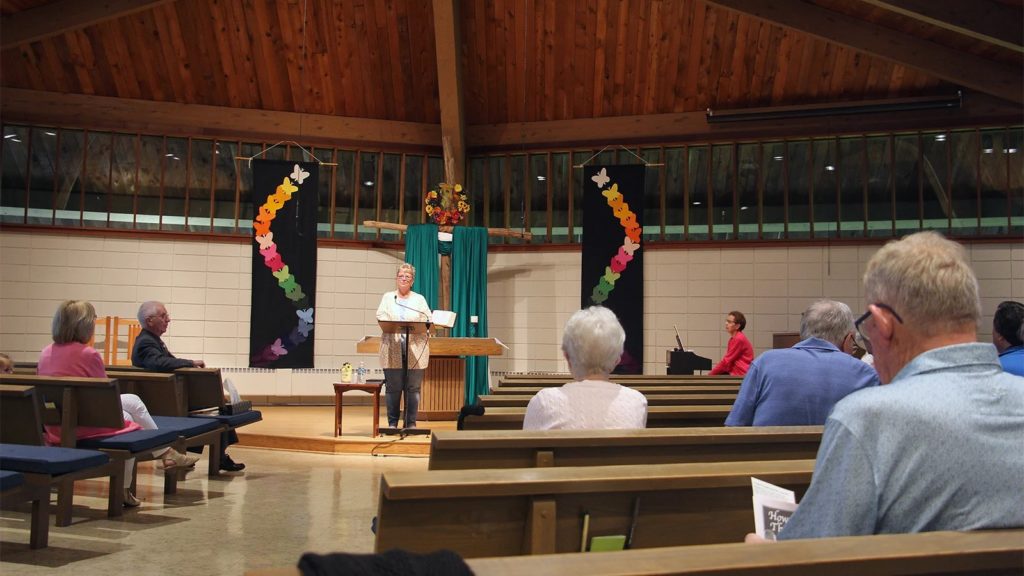
But most of the day’s emotion was reserved for a more immediate cause for celebration: the 60th wedding anniversary of two church members. Nearly 50 people, a larger-than-normal weekly turnout, gathered after the service around colorful plastic tablecloths in the church’s fellowship hall to toast the couple.
To date, more than 5,550 of the United Methodist Church’s approximately 30,000 U.S. churches have disaffiliated from the country’s second-largest Protestant denomination since 2019, according to the unofficial tally kept by United Methodist News.
And while most of those churches have followed the disaffiliation plan outlined by the United Methodist Church’s General Conference, other congregations and annual conferences have tried different ways to leave the mainline denomination — to varying degrees of success.
According to the disaffiliation plan
In 2019, as long-simmering disagreement about the ordination and marriage of LGBTQ United Methodists finally boiled over, delegates gathered for a special session of the denomination’s global decision-making body, the General Conference.
Those delegates strengthened existing language in the denomination’s rulebook banning same-sex marriage and LGBTQ clergy.
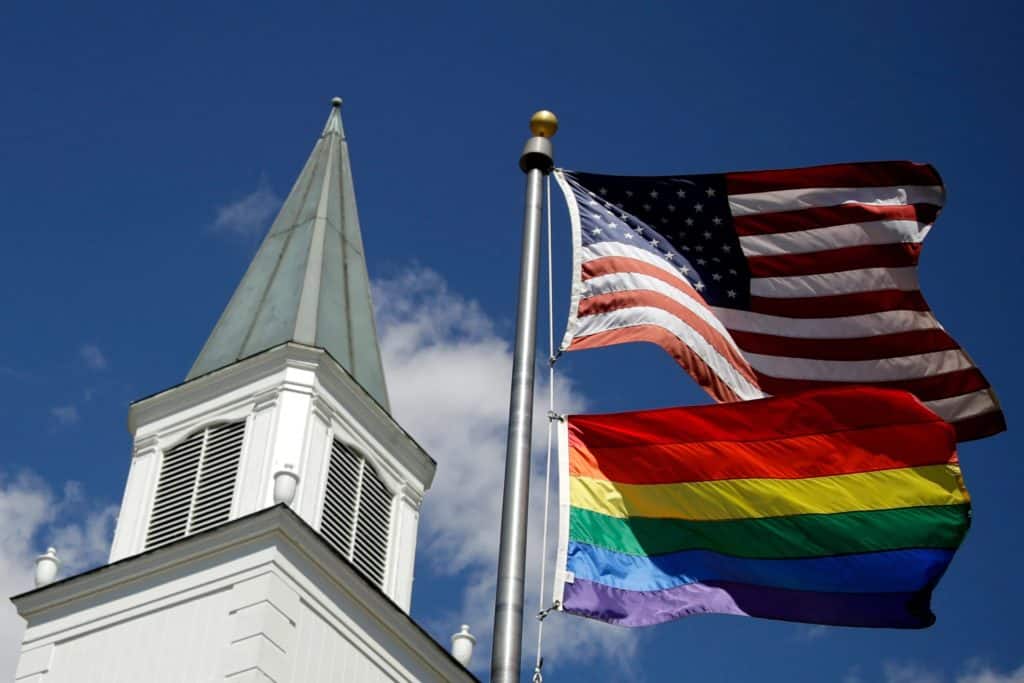
They also added a disaffiliation plan to the Book of Discipline (Paragraph 2553, for those with a copy handy) allowing churches to leave the United Methodist Church for “reasons of conscience” related to the denomination’s stance on sexuality through the end of this year. To leave with their properties, which are held in trust by the denomination, congregations must take a vote and meet certain financial obligations, including paying the rest of the current year’s apportionments, the next year’s apportionments and its pension liabilities.
In the years since, divides have deepened: A protocol to officially split the denomination was proposed, then scrapped as the 2020 General Conference was postponed to 2024; a new theologically conservative Methodist denomination called the Global Methodist Church was launched; and disaffiliations have accelerated as the extended window to complete the process closes.
Like most churches, the Rev. Mao Her said, her congregation at Christ United Methodist Church near Milwaukee hoped the special session would resolve the disagreement within the denomination. Then they hoped it would be the protocol.
When that resolution never came, Her said, the church’s leadership board decided to discuss disaffiliation with the congregation.
It was a time-consuming process, and the pastor said she felt like the annual conference made it purposely difficult, but she understands why: “If you are not sure and if you are not convicted about leaving, you know, you’re not going to be able to go through this process. It takes a lot of time and effort, and it costs a lot of money.”
The pre-conference workbook on the Wisconsin Annual Conference’s website put the price tag of Christ United Methodist Church’s disaffiliation at more than $100,000. That’s a lot of money for a church whose proposed 2023 budget includes less than $163,000 in revenue.
But the church was convicted.
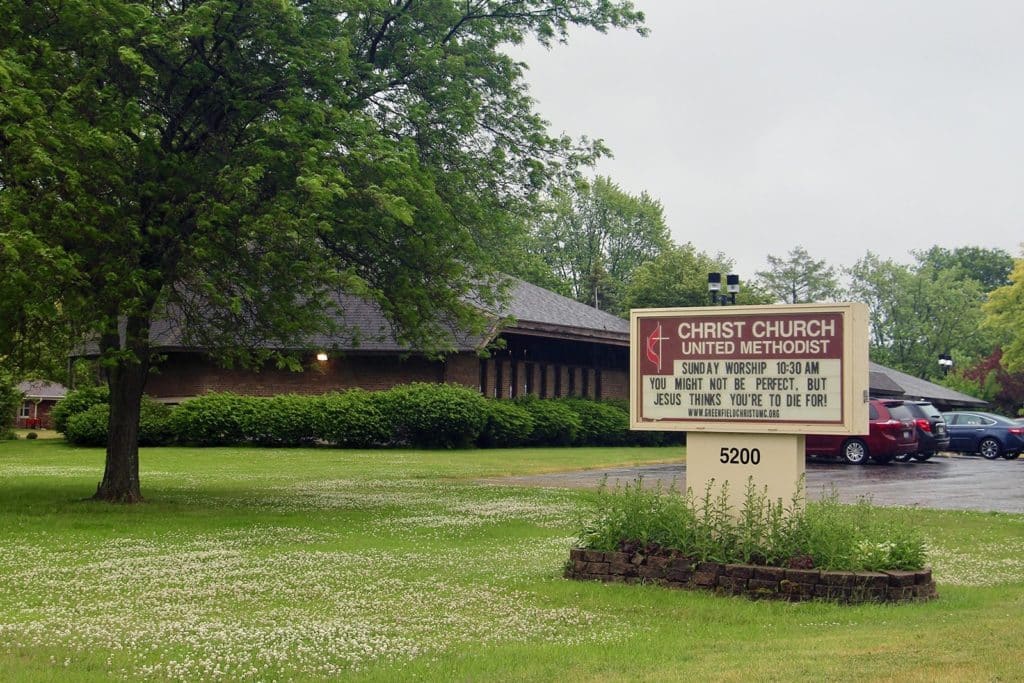
Christ United Methodist Church was founded in 1965, according to Her. When she arrived in 2013, about 65 people were worshipping there each Sunday. That number since has been cut in half, she said, noting some in the mostly elderly congregation have passed away and some have not returned to services since the pandemic.
Those congregants are “very family-oriented,” “very faithful” and “pretty traditional in their theology,” she said. That includes a belief that the Bible teaches a view of “traditional marriage between a man and a woman,” she said, but she explained the debate over sexuality within the United Methodist Church is really just a symptom of deeper divides.
“What it boils down to is our understanding and our interpretation of the Scripture,” Her said.
The pastor said the church now plans to join the Global Methodist Church, which has created a home for disaffiliating churches that feels familiar.
“All of the leaders and pastors are coming out from the United Methodist Church, you know, so this is just like home. It’s nothing new,” Her said.
Under a previous provision
Before there was Paragraph 2553, there was Paragraph 2549.
That previous provision in the Book of Discipline is generally used when a church closes “because it no longer serves the purpose for which it was organized,” according to information on the South Carolina Conference’s website.
It also is the provision the South Carolina Conference is asking its churches to follow to disaffiliate from the denomination as part of its “Local Church Discernment Process,” which allows the annual conference to close a church and transfer its assets to a new entity.
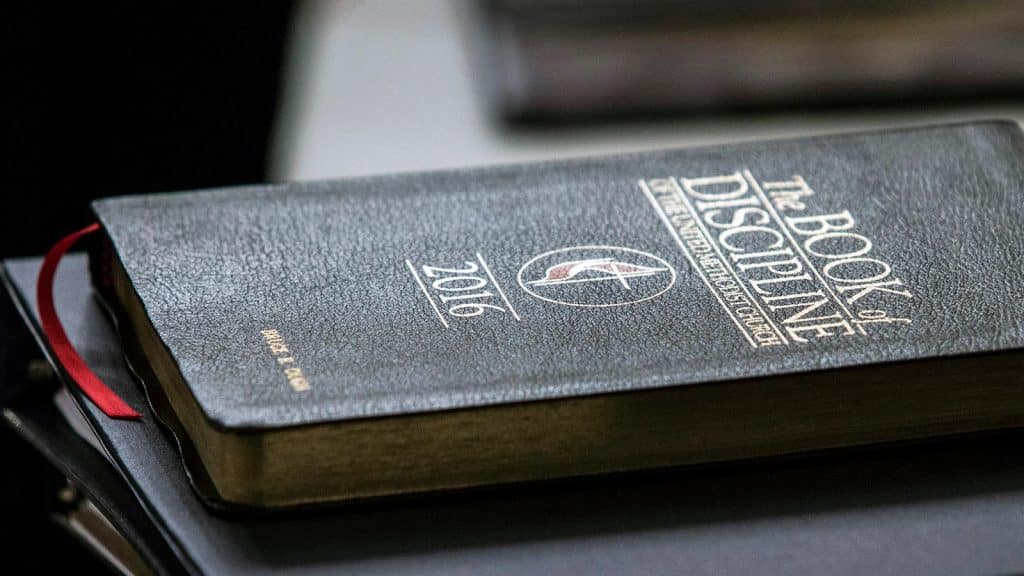
The conference’s reasoning, according to its website, is that no local churches in South Carolina qualify for the disaffiliation plan, “since they do not profess to disagree with the human sexuality language in the Book of Discipline or how the South Carolina Conference has interpreted it.”
The Book of Discipline currently states that “the practice of homosexuality is incompatible with Christian teaching” and that “self-avowed practicing homosexuals” cannot be ordained as ministers, appointed to serve or be married in the church — the same view shared by many congregations leaving the United Methodist Church.
The Protocol of Grace and Reconciliation Through Separation that was proposed in 2020 would have created a new “traditionalist” denomination and allowed the remaining United Methodist Church to vote to change that language, but it was abandoned as the 2020 General Conference was delayed three times for pandemic-related reasons.
At its annual conference meeting earlier this month, the South Carolina Conference approved disaffiliation requests by 113 churches under that previous provision outlined in Paragraph 2549.
By declaration
Then there’s St. Andrew Methodist Church in Plano, Texas.
Last fall, St. Andrew, the second-largest congregation in the North Texas Conference and the seventh largest in the state, simply declared it was leaving the United Methodist Church. That decision was made by the church’s executive council and leadership.
“The process by which St. Andrew made this decision is unique in the history of our Wesleyan tradition, which requires congregational votes on major decisions,” then-Bishop Michael McKee told United Methodist News in October.
It didn’t work. The disaffiliation plan requires a two-thirds vote from church members present at a specially called church conference in order for it to walk away with its property and assets. The church wound up holding such a vote in February — with 98.6% of those voting choosing to leave the denomination, 859 to 12 — and making the necessary payments under that plan.
Meanwhile, another Texas church was more successful in declaring its departure. In July 2021, members of First United Methodist Church of Blue Ridge, now Christ United Church, voted to leave the denomination and adopt amended articles of incorporation and bylaws under Texas law.
The North Texas Conference sued Christ United, but no injunction was ever issued, and the terms of the settlement are confidential. Both the church’s lawyer, Carol Wolfram, and the North Texas Conference declined to share specifics about the settlement.
But, Wolfram said, “The North Texas Conference was taking the position that (Christ United) needed permission from them to disaffiliate, that they did not have the right under Texas law to disaffiliate without the blessing of the Methodist Church.”
Christ United was able to show that the deeds to church property were not in the name of the conference, but of members of the church, she said. For $25, it filed as a non-denominational church with the Texas Secretary of State, essentially disaffiliating from the denomination.
With lawsuits
The National Center for Life and Liberty, a legal ministry with offices in California, Florida and North Carolina, claims to represent at least 2,000 churches that have sought to leave the United Methodist Church, working on legal strategy with the theologically conservative Wesleyan Covenant Association, according to United Methodist News.
Last month, the National Center for Life and Liberty won a lawsuit representing 185 churches in Georgia when a judge ruled the North Georgia Conference couldn’t just press “pause” on disaffiliations from the denomination by churches in its area until the next General Conference meeting happens in 2024.

Another prominent church in the same conference — Mt. Bethel Church in Marietta, Georgia — also successfully sued to disaffiliate from the denomination last year, following a dispute with the annual conference after its pastor was reassigned.
Not all suits have been so successful.
Earlier this spring, judges dismissed two prominent lawsuits originally brought by more than 100 churches in Florida and 36 in Western North Carolina, both represented by the National Center for Life and Liberty, wishing to immediately disaffiliate from the denomination. David Gibbs III, president and general counsel for the National Center for Life and Liberty, said Florida is appealing that decision and that Western North Carolina is resolving its case with the annual conference.
Gibbs said he first began helping United Methodist churches disaffiliate around 2018. The “quickest, most efficient” way to do that is by following the disaffiliation plan, he said, but some churches, especially in urban areas, cannot meet financial obligations that have been added to the plan by their annual conferences, such as paying 50% of the church’s appraised value.
Gibbs said he believes the fees associated with disaffiliation, which vary per church and conference, has prevented many churches from leaving the denomination.
When churches cannot meet those financial obligations or feel the costs violate their conscience, he said, “that’s where litigation has become necessary.”
Emily McFarlan Miller is a national reporter for Religion News Service. BeLynn Hollers is an editorial fellow for The Dallas Morning News’ editorial board.





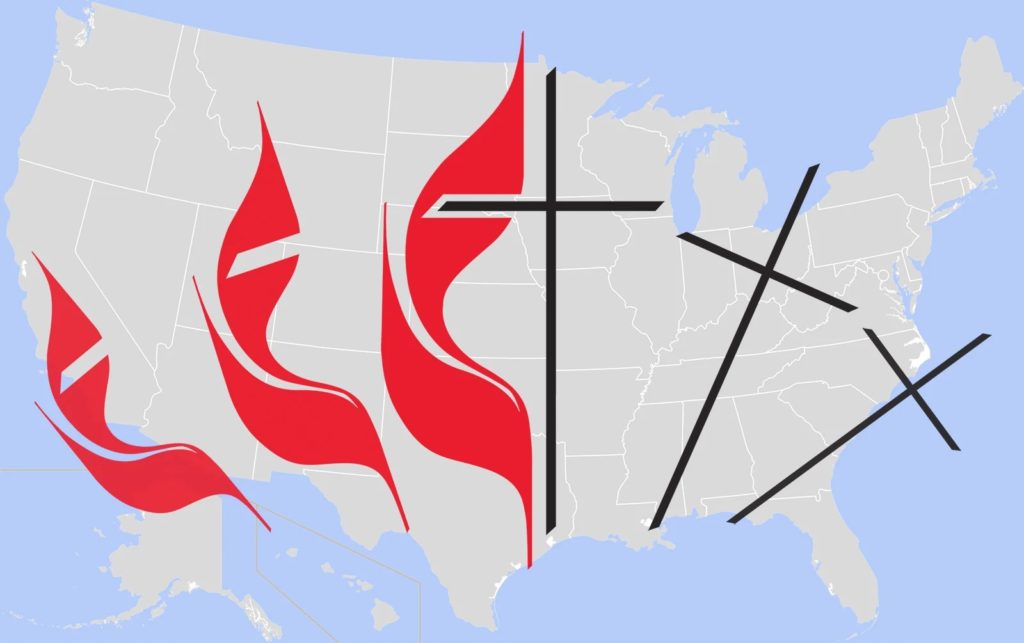

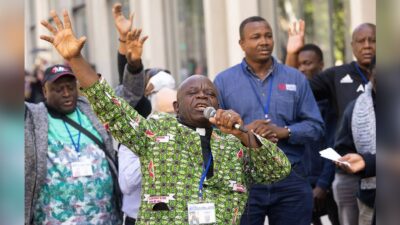

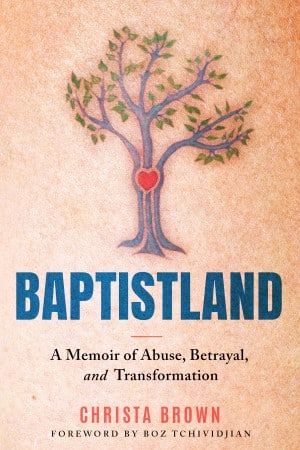










3 Responses
Great reporting, Emily and BeLynne. I appreciate this ministry.
[[but she explained the debate over sexuality within the United Methodist Church is really just a symptom of deeper divides.
“What it boils down to is our understanding and our interpretation of the Scripture,” Her said.]]
That last part is often a lie. It boils down, in most cases, to just this issue. And that is sad. Because most of us who think Adam and Larry should get married also have not one whit of desire to change the Apostles’ creed, nor the Scriptures.
Facts matter. In the case of the UMC (of which I was an employee for 17 years), the denomination is practicing lawlessness. They aren’t following their own Book of Discipline. The council of bishops isn’t enforcing the Book of Discipline. Churches are forsaking sound Christian doctrine and deciding for themselves what’s acceptable and what isn’t. They are completely disregarding the will of the majority of the global church. Yet Main St. UMC in Everytown, USA has to shell out ridiculous amounts of cash to keep their building and the Pastor’s retirement plan. It’s kind of like having a family member commit a crime, yet everyone else in the family has to pay the court imposed fine. It should be the churches turning their backs on the Book of Discipline and more importantly Scripture who should be paying to leave. It’s sad.